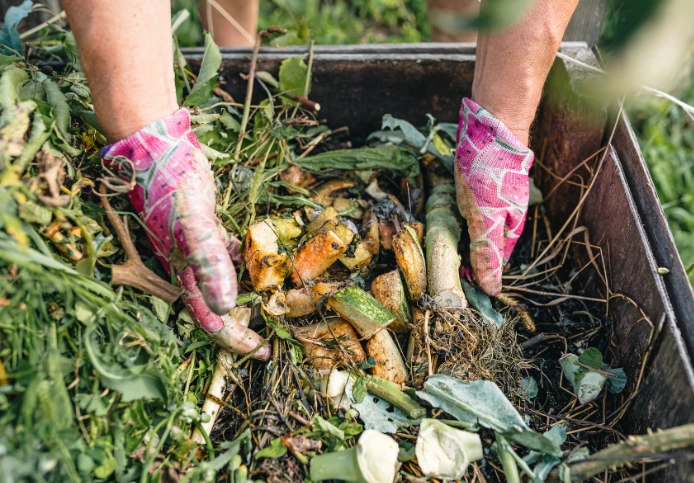Composting our food scraps, yard waste, and unlined soiled paper has numerous important benefits: it reduces methane emissions from landfills, prevents unnecessary waste from taking up space in landfills, helps soil retain moisture, and returns nutrients to the soil without the use of chemical fertilizers. Not only is compost an incredibly important climate action we can all take every day, it is now also the law in California to keep compostable material out of our landfills.
Zero Waste Marin understands that diverting green waste and food scraps at home isn’t always intuitive. Some items are confusing, and each waste hauler in Marin County has their own rules for residential compost collection.
Review the FAQs below for helpful tips, resources, and a list of the most common items that belong in your compost cart.
Food Scraps
Regardless of their condition, all food scraps belong in the compost. If food scraps go to landfills, they create methane gas. Methane is a short-lived climate pollutant like carbon dioxide; a powerful heat-trapping gas that contributes to climate change. By composting our food scraps, we can return nutrients to the soil and avoid methane emissions from landfills.
Whether it’s raw (such as banana peels and carrot tops), cooked (such as plate scrapings, meat, and bones), or rotten (such as expired leftovers and takeout) — it all belongs in the green cart.

Food Soiled Paper
While clean paper can be recycled, when paper materials are wet, greasy, or covered in food, they are not clean enough to be recycled. However, paper and cardboard are made from trees, so soiled paper should be composted!
Soiled paper that has no plastic coating such as paper napkins, paper towels, paper plates, coffee filters and pizza boxes belong in the green cart. Paper with a shiny surface is not compostable and belongs in the garbage; for example, coffee cups and milk cartons do not belong in compost because they have a plastic liner.

Yard & Garden Waste
If you have plant trimmings from your yard, flowers that wilted, or a house plant that died, make sure it ends up in your green cart! However, be careful not to put excess amounts of dirt in your carts — large amounts of dirt and rock do not belong in your compost cart.

Human and pet waste and related products, including:
Coated or lined paper, including:
“Compostable” or “biodegradable” plastics, including:
Recyclable or landfill materials, including:
Zero Waste Marin offers kitchen compost pails at many local events, including fairs, community events, and farmers’ markets.
You can also contact your local hauler to see if they provide compost pails.
The majority of compost collected in Marin is processed at the Waste Management EarthCare facility in Novato. This facility produces compost that is certified organic by the Organic Materials Review Institute (OMRI). This means that the compost produced at WM EarthCare is a high-quality compost that can be used on organic farms.
The compost facility in Marin is not unlike many of its counterparts in California — the majority of which do not accept compostable plastics. This is due to issues with this material not actually breaking down, causing contamination in finished compost, and causing confusion for consumers and facilities due to looking nearly identical to regular plastics.
“Compostable” bags cannot be used by residents served by Marin Sanitary Service, Mill Valley Refuse Service, Recology Sonoma Marin, or Tamalpais Community Service District because they are not accepted at WM EarthCare in Novato.
The compost collected by Bay Cities Refuse in the communities of Sausalito and Marin City is delivered to the compost facility in West Contra Costa County; this facility accepts compostable bags.
Backyard composting is an option for those who would like to process their own organic waste in their backyard; there are several differences between backyard composting and curbside composting through your waste hauler.
For your large green rolling cart: To prevent odors, mix food waste with yard waste and fiber materials such as soiled paper or cardboard (like a pizza box!). Add one layer of yard waste, newspaper, or shredded paper to the bottom of your green cart before adding food scraps.
For your kitchen compost pail: Because compostable plastic bags are not permitted in the majority of Marin, there are several other methods you can use to prevent smells:
Backyard composting is an option for those who would like to process their own organic waste in their backyard; there are several differences between backyard composting and curbside composting through your waste hauler.
When compostable materials are placed in your green cart and collected by your waste hauler, the material is hauled to a large-scale, industrial composting facility like WM EarthCare in Marin. Backyard compost does not generate the same physical conditions as these industrial facilities. At industrial compost facilities, microbial activity is much greater, and the pile temperatures reached at these facilities are much higher. Backyard composters must consider that their significantly smaller piles will have lower temperatures and will present different considerations about pests and what materials will successfully break down.
Visit the EPA’s website on backyard composting to learn more about setting up a system, adding the right mix of food waste and yard waste, what materials are successful in a backyard system, and more! To learn from a local source, check out Marin Master Gardeners.

Please visit our Who is My Hauler page.